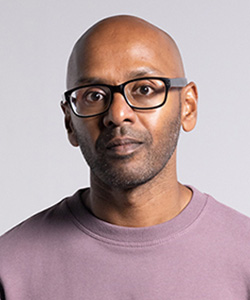By Mohan Sivaloganathan

Keep the personal and the business separate. It’s time to retire this antiquated script for achieving success, because today’s workforce of Gen Z and Millennial leaders are designing a better and healthier approach before our eyes. I vividly remember a moment that taught me how making the work personal is imperative to success. I was in my first job coming out of college, working for a large corporation on a manufacturing site. My ambitions superseded everything and I had tunnel vision: I was going to rise up the corporate ladder, with validation coming from numbers, documents, and results. As a man of color and second-generation immigrant in the United States, I was always taught that burying yourself in work ethic and ambition was the only path to success. Driven by this formula for success, I started operating like the machines on our manufacturing floor, working solely on my own, and treating my co-workers as robots. My system was shocked when I couldn’t achieve desired results, which wasn’t about strategy, mechanics, or dashboards. My team members started to distrust my intentions because they simply didn’t know who I was, and I didn’t care to know them either.
I was building a wall that separated me from work, which fueled my skepticism when I was invited to participate in a team building workshop called People Supporting People. In one session, the facilitator asked us to chart out our lives. The X Axis of the chart represented time, and the Y Axis of the chart represented highs and lows that happen throughout our lives. I sat back and absorbed the stories that my team members shared. One person drew a line to a “high” point and spoke glowingly about their wedding, and then sent the line downwards to the “low” point of their spouse being diagnosed with cancer. Another person talked about the “high” of discovering purpose and community by serving in the military, and the “low” of losing a friend during the 9/11 attacks. As my team members illustrated their highs, I heard about the birth of their children, becoming the first ones in their families to graduate from college, and their pride in seeing loved ones succeed. I also felt the weight of the room as those same individuals brought us on a ride through the lows of illness, barriers to mental health, and tragedy.
The room was flooded with tears and emotion, and my eyes were wide open. It was the spark I needed to see people – and to be seen. It would generate the transformative power of empathy in my day-to-day work, and ultimately contribute to collaborative success in a business context. This shared success wouldn’t have happened if I hadn’t heard their stories.
As teams are increasingly fractured by mass layoffs and the ongoing “Great Resignation,” it is even more imperative that leaders establish storytelling as a strategic lever. Organizational health requires an expansive view that builds agency, belonging, and culture. We are in the midst of a transformative generational shift, marked by Gen Z and Millennials demonstrating that they are prioritizing purpose and authentic connection in the workplace. They’ve challenged historically flawed mindsets and structures that too often have led to burnout and inequity. By illuminating individual and collective stories, and especially by opening the aperture for marginalized groups, organizations can shed light on the challenges and biases faced within their own stakeholder communities. Storytelling can be used to challenge old constructs that have suppressed the voices and experiences of people, and resultantly, their impact.
Safe spaces that embrace personal stories lead to more effective collaboration, resilient and desirable work cultures, and accountability with respect to equity. Consider the example of HP, which discovered that women and people of color in tech were structurally silenced and overshadowed, and responded by establishing transparent goals for career advancement and partnering with companies to invest in the Black talent pipeline. The stories and feedback of employees was also an impetus for change at Starbucks, leading to mentoring programs and a publicly available anti-bias curriculum. It is no surprise that both companies were ranked in the top 50 of JUST Capital’s rankings of publicly traded companies that create a more inclusive and effective economy.
At Our Turn, an organization that builds youth-led movements to reimagine the education system, storytelling is an indispensable strategy. When young people join Our Turn and share their story in spaces ranging from school board meetings to classroom presentations, it is a barrier-breaking tactic. Storytelling helps young people, who have historically been taught that burying themselves in work ethic and ambition is the only path to success, to lean into their unique identities, because their authentic experiences generate compassion and connectedness. With that foundation, they discover agency and the confidence needed to make a positive difference for themselves, their peers, and the education system. After all, if you feel suppressed and your experiences don’t matter, how could you ever seize opportunities for advancement? At Our Turn, we build structure for storytelling by training staff members on how to shape and deliver their “story of self,” creating virtual and in-person venues for storytelling, and ensuring it is a part of any external advocacy action. In pursuit of improving education, and supporting the next generation of workforce leaders, we don’t skip ahead to policy making with an “end justifies the means” approach. We lift the stories of young people as irreplaceable inputs, thus positioning them as active catalysts for beneficial outcomes.
Any advancement in work or educational systems requires honest storytelling to dismantle structural and cultural barriers. For people in positions of power, there is a risk that efficacy can be subverted by cynicism or indoctrinated patterns, similar to how I felt early in my career. Too many institutions are fearful of what they might hear, and the gaps that might be revealed. In other cases, storytelling is viewed as a soft skill or a “nice-to-have,” versus a method that can be developed and curated. Nevertheless, confronting those barriers is a part of the beauty of a great story, for any memorable journey requires adversity, reflection, and even conflict.
Our society has reached a critical tipping point. There are emerging calls to “be yourself ” or “be authentic,” in order to promote wellbeing and individual purpose. In many workplaces, however, the prevailing school of thought centers on simply working hard at all costs. I’m grateful for that workshop I took part in many years ago, because it proved that we don’t have to engage in a zero-sum game. With storytelling, we harmonize identity with impact. I had to break away from my old wiring and embrace the beauty of the stories that surround me. It gave me the confidence to embrace and elevate my own story, which has opened doors for success that were previously unimaginable. In this chapter of our history, we can write a new story which dismantles the fictitious zero-sum game of success. Through storytelling, we will chart a path that affirms our identities, builds bridges, and creates a more empowering work environment for all.

Mohan Sivaloganathan
Mohan Sivaloganathan is known as the “Batman of Social Impact.” He is the CEO of Our Turn, the nation’s leading youth-driven movement for education justice, and uses the power of music to spark changemaking worldwide.






